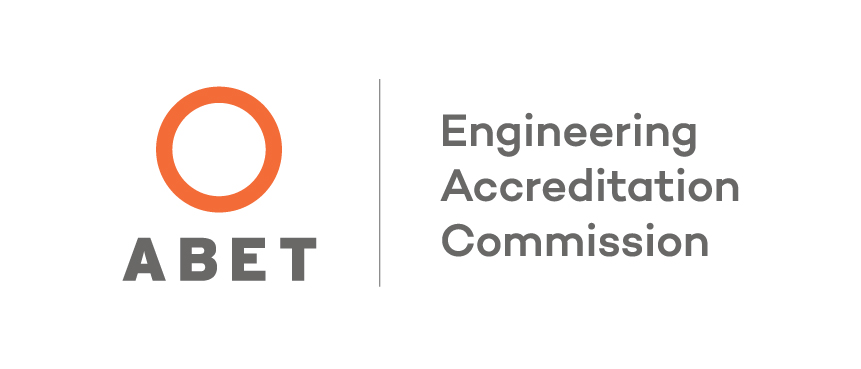Accreditation
Architectural Engineering Program

The Architectural Engineering (B.S.) degree program is accredited by the Engineering Accreditation Commission(s) of ABET, under the General Criteria and Program Criteria for Architectural and Similarly Named Engineering Programs. The ABET accreditation process, a voluntary, non-governmental process of peer review, helps assure quality in educational programs. ABET-accredited educational programs must meet certain defined standards.
Architectural Engineering Program Mission
The Architectural Engineering Program will provide students with the tools necessary to solve architectural engineering problems critical to our society's well-being. This will be accomplished through a comprehensive, forward-looking and broad-based architectural engineering curriculum emphasizing fundamentals, practical applications, oral and written communication skills, computer applications skills, and professional practice issues and ethics. The Program will prepare graduates for entry into the architectural engineering profession, for life-long learning, and to function as architectural engineers in a global society.
Program Educational Objectives
Consistent with the mission statement, graduates of the Missouri S&T Architectural Engineering Program will demonstrate:
Technical competency, as evidenced by:
- Holding the PE within six years of graduation
- Lead responsibility for project tasks including preparation of project documents, preparation of project specifications, and/or overseeing aspects of contract administration
- Utilizing and understanding resources including codes, standards, specifications, contracts, and business practices within a company
- Critiquing or reviewing others’ work
- Mentoring staff with less professional experience
An ability to communicate effectively, as evidenced by a combination of:
- Successful interaction with clients and peers in written and oral form, such as:
- Leading role in oral communication/interaction at team-level project meetings at three years beyond graduation
- Leading role in oral communication/interaction at client-based project meetings at six years beyond graduation
- Generating written reports, with supervision, related to project documents, project specifications, and/or contract administration at three years beyond graduation
- Generating full-scope written documents with supervision, related to project proposals at six years beyond graduation
- Critiquing or reviewing others’ work in oral and written form
Continuing professional development, as evidenced by a combination of:
- Holding the PE within six years of graduation
- Educational development in the form of:
- Continuing education/professional seminars (in-house or external)
- Professional workshops
- Advancement or completion toward advanced degree
- Advancement in technological developments (LEED, Energy Star, sustainability, etc.)
- Advancement in their chosen field or career path
- Participation in professional societies/organizations
- Maintain connections to Missouri S&T
Managerial competence, as evidenced by a combination of:
- Managing project tasks and/or a small project with limited supervision
- Communicating effectively with clients and staff outside of discipline
- Critiquing or reviewing others’ work
- Developing a scope of service and/or generating a schedule for performance of work
- Demonstrating responsibility for:
- Time management
- Cost management and/or scheduling resources
- Management of lower-level staff members
An ability to work in teams, as evidenced by:
- An ability to function and communicate within a team
- An ability to provide technical knowledge to a team
- Critiquing or reviewing others’ work
Professional responsibility, as evidenced by a combination of:
- Activity in professional societies/organizations
- An understanding of the greater impact of a particular project (aesthetic concerns, environmental concerns, ethical concerns, financial concerns, and long-term concerns)
- An appreciation for the role of various disciplines within your profession
- Mentoring staff with less professional experience
- Holding the PE within six years of graduation
- Community involvement (at six years after graduation)
Student Outcomes
Consistent with its mission graduates of the Missouri S&T Architectural Engineering Program will have:
- an ability to identify, formulate, and solve complex engineering problems by applying principles of engineering, science, and mathematics
- an ability to apply engineering design to produce solutions that meet specified needs with consideration of public health, safety, and welfare, as well as global, cultural, social, environmental, and economic factors
- an ability to communicate effectively with a range of audiences
- an ability to recognize ethical and professional responsibilities in engineering situations and make informed judgments, which must consider the impact of engineering solutions in global, economic, environmental, and societal contexts
- an ability to function effectively on a team whose members together provide leadership, create a collaborative and inclusive environment, establish goals, plan tasks, and meet objectives
- an ability to develop and conduct appropriate experimentation, analyze and interpret data, and use engineering judgment to draw conclusions
- an ability to acquire and apply new knowledge as needed, using appropriate learning strategies

Follow Civil, Architectural and Environmental Engineering